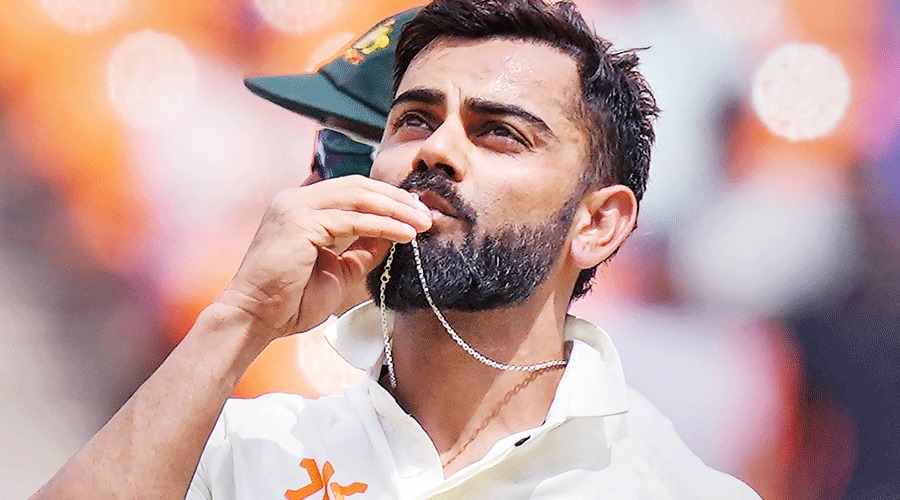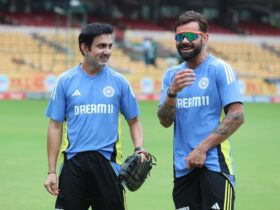Virat Kohli India vs Australia Border Gavaskar TrophyThe mental focus to overcome the technical side, but for a man who once thought batting was 70 percent technique, it can’t be easy. (X/BCCI)
It’s a scene from Perth in January 2012, a couple of days ahead of India’s third Test against Australia. Virat Kohli had failed in the first two Tests and there was a talk bubbling around that Rohit Sharma might replace him.
As one ran into Kohli at the nets, the ‘You playing?’ a query was put to him. “Will get to know tomorrow,” he replied. The next day, on the eve of the Test, Rohit had a forlorn look at the nets. The memory of him kicking the ground and staring ahead at nothing in particular is still seared in the mind. It was clear who was going to be in the playing XI.
On Day 1 of the Test, with India tottering at 63/4, Kohli had walked past the departing Gautam Gambhir and into a crisis. Awaiting him in the middle was VVS Laxman, a batsman facing the heat right at the end of his career. Off the seventh ball Kohli faced, still on zero, he would hesitantly drive away from his body. These days, it flies to waiting palms behind the stumps. That day, though, it flew past the slips and ran down to the boundary. What would have happened had it gone to hands? Would the management’s confidence in him fade out and a waiting-in-the-wings Rohit Sharma be given a chance in the next game?
Virat KohliVirat Kohli trains at the WACA in Perth. (BCCI | X)
As it would turn out, he would top score in both innings; 44 in the first and a sparkling 75 in the second where he was the last man to be out in otherwise dismal Indian performance. India went down 0-3 but Kohli had emerged unscathed out of the trial by fire.
Back then, he was a youngster struggling to come to terms with Test cricket overseas. He had been felled by Fidel Edwards’s bouncers in his debut series in West Indies in 2011, and was almost on the edge of wilderness in 2012 before the runs in Perth gave him a lease of life.
Festive offer
Now, he is there in the same city with uncertainty of different nature on the other side of his career. For his level of fitness, 36 isn’t really that old.
In that 2012 series much of India’s Fab Four finally disintegrated, they were all nearly 39, and not as fit as Kohli is now. Sachin Tendulkar’s issues that tour still baffles; until the ball he would get out to, he would bat like a million bucks but just couldn’t string together a substantial knock.
Dravid had started off promisingly but as the series went on, would keep hearing the death rattle behind him as he seemed fractionally slow to get into the position. The batsman who depended on eye-hand reflexes the most, amongst the Fab Four that is, Laxman couldn’t put together any sort of resistance.
“It’s not a great feeling to wake up knowing that you won’t be able to score runs… I felt I was the loneliest guy in the world,” Kohli had once said in a podcast with Mark Nicholas about his iffy-form days. It’s an important admission about how the mind can get messed up even with the best, but there was something else he said in that podcast that has been intriguing.
It was his views on his batting. “I see batting as 70 percent technical. I know a lot of people say 80 percent mental; in a preparation point of view yes. But I believe … if your foundations aren’t strong, you can’t be mentally strong as you will have doubts about your own game. And you are fighting with yourself first rather than thinking of what I can do here.”
India bastmen, Virat Kohli, India vs New ZealandIndia bastman Virat Kohli walks back after getting out on Day 1 of the third Test at the Wankhede Stadium in Mumbai. (Express Photo by Amit Chakravarty)
The usual cricketers’ cliché is about how it’s 80-90 per cent mental but Kohli sees it differently. In his preparation, he does everything possible mentally. He visualises smashing the bowlers. He pushes himself mentally to go for the shots in the gaps rather than be wary about the thought that it might get him out. All this before a game. But essentially he viewed batting as 70 per cent technical.
Technical issues
And there are a few technical issues gripping him right now.
– He struggles against spinners on tracks that aid turn. Sanjay Manjrekar has pointed out how he rarely gets on the backfoot these days, dragging himself into more trouble as a result. He probably is not picking the lengths as quickly and as correctly as before.
– There is also this DRS-lbw-concern. Where previously he could go a touch closer to the ball as he trusted his game to get him out of trouble in case the ball does more mischief than he anticipated; these days he doesn’t. Kohli prefers to stay on the leg-stump line, planting that front foot almost straight down that line. Resultantly, he finds himself groping for the turning ball away from the body. The edges and bat-pad-catches aren’t then a surprise. In Australia, Nathan Lyon is bound to go round-the-stumps to try to target that opening.
– An older issue has cropped up against pace. The semi-frozen back-leg movement and the hip alignment that he had religiously worked to set right after a tip from Sachin Tendulkar after the disastrous series against Anderson in England. He has invariably ended up chasing balls far away from the body.
It’s not that Kohli isn’t aware of these problems, he has actually tried different things. Because it perhaps stems from his philosophy that batting is 70 per cent technical. His mental health issues, that he has spoken about publicly, are bound to have made the entire process that much more complicated.
“Batting is about a split second of decision. The precision of that split-second has to be so good every ball during the game,” Kohli had once said in a podcast with Graham Bensinger. “With visualisation (before the game) you have to convince yourself that you can do it. You tune your head so that it becomes so convincing.” The only difference was that it was said by a Kohli who didn’t have to worry about his technique.
India’s Virat Kohli dives in vain to prevent being run out by New Zealand’s Matt Henry during the first day of the third Test at Wankhede Stadium, in Mumbai. (AP Photo)India’s Virat Kohli dives in vain to prevent being run out by New Zealand’s Matt Henry during the first day of the third Test at Wankhede Stadium, in Mumbai. (AP Photo)
It’s perhaps befitting to return to that Test match in Perth in 2012. A day prior to that game, MS Dhoni, the captain, was asked if the team was going to trust and give Kohli one more chance in Tests. “That you have to wait,” was the reply. Has he said anything to Kohli after the failures of the first two Tests? Dhoni was more forthcoming.
“Nothing specific. Because, you know what, ODI cricket helps you to get used to the pressure that is involved in international cricket. If you have enough runs behind you, you have your confidence. What you need to perform at the Test level… He’s a good batsmen, he prepares well for a game. He just needs to go with the flow, so nothing wrong in particular, and hopefully we will see him among the runs,” Dhoni had said.
12 years later, it might come down to that “flow” yet again. A batsman who does a lot of mental preparation before the game because he was more confident about his game has been forced these days to fuss about his technique more. And it’s obviously a vicious cycle.








Leave a Reply